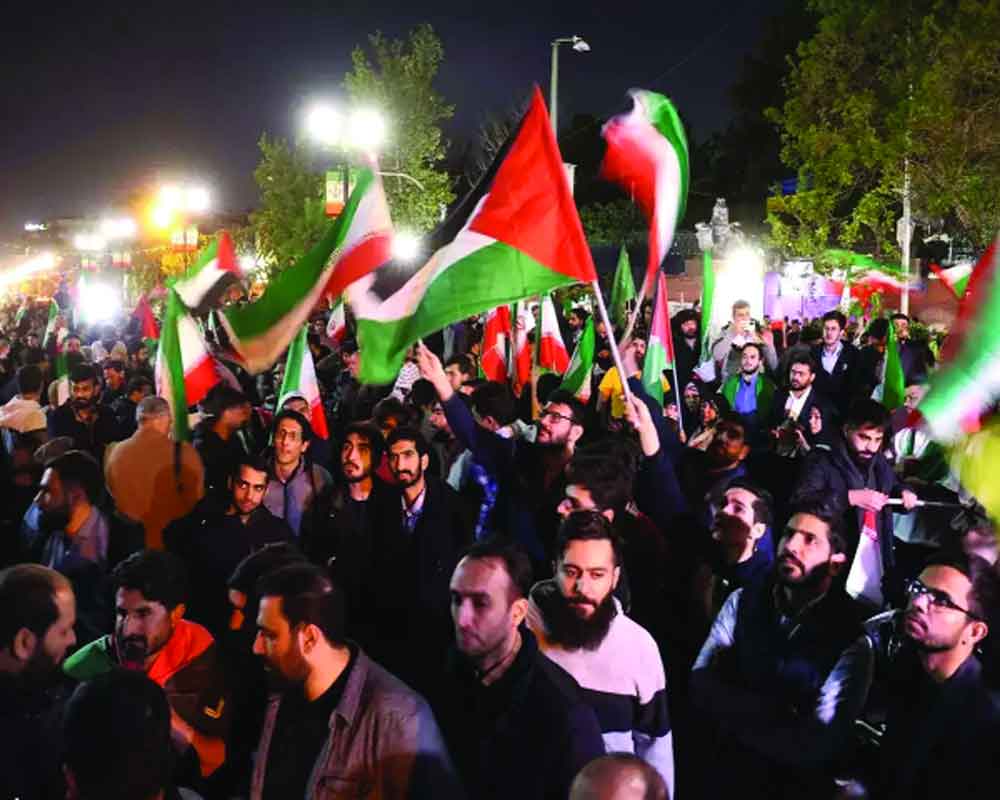Amid geopolitical complexities, India finds itself navigating a delicate balance between Iran, Israel and its domestic constituencies
Persians have had a civilisational connection with Hindustan (Persian for India) since antiquity. There is a powerful India connect, even for the most epochal person defining the politics of the post-Iran Revolution (1979) i.e., Ayatollah Ruhollah Khomeini. His paternal grandfather, Seyed Ahmad Musavi ‘Hindi’, was born in Kintoor, near Lucknow. Musavi was to leave Awadh and settle in Khomein but was popularly known as ‘Hindi’ in Persia! Later, ‘Hindi’ was to be the pen name for Ruhollah Khomeini’s poetry.
In India itself, Shiite dynasties flourished as refugees escaping persecution from Arab-Sunni strains settled and thrived in Deccan, Rampur, Awadh, Bengal etc., with Lucknow emerging as the epicentre of Indian Shi’ism. Unlike the Middle East, the sectarian tensions were relatively less as the Gazetteer of Gilgit Agency noted, “Wherever Sunnis and Shias are found living together, they seem to practice a mutual tolerance rare in other Muhammadan communities. Except in Chilas and the Indus valley below or, there is, generally speaking, a complete absence of fanaticism”. But, times changed and polemical writings of supremacist and sectarian assertions increased, causing bloody rift and polarisation. Soon, even in India the numerically lesser Shias were harassed by the substantially larger Sunni populace, leaving only pockets of Lucknow and Kargil area to have Shias in majority, as other enclaves were predominantly Sunni dominated.
‘Shiaphobia’ acquired even more sinister propulsion in neighbouring Pakistan and the air of the Sunni-Shia divide soon acquired political/sovereign overtones with Iran emerging as the transnational voice of Shiite sensibilities. The Ummah (Muslim world) got divided into two broad ‘blocs’ on sectarian lines and the shadows of Iran-versus-Arab Sheikhdoms undercurrents played out violently in areas with mixed populations e.g., Lebanon, Yemen, Syria, Bahrain, Pakistan and even so in India, though the sectarian tensions were not so pronounced here. This unique phenomenon of the relative security, freedom and thriving of Shias in India (where their percentage was in a similar minority to many other Islamic countries with the Sunni majority) did not go unnoticed in Tehran.
India was a rare haven for Shias in modern times and Iran reciprocated the same by occasionally taking a pro-India stand on platforms like the Organisation of Islamic Cooperation (OIC). That the fate of minority Shias in Pakistan was particularly beleaguered, made Tehran adopt pro-Delhi postures as geopolitical quid pro quo. As the Arab Sheikhdoms were particularly close to the Pakistanis during the Cold War, Iran acted on the rebound by deepening relations with India. But the inevitable consequences of the Iranian Revolution and the need for it to take more puritanical stances and aspire to take over Ummah leadership from Saudi-led Sheikhdoms led to it occasionally striking contradictory postures on issues like Kashmir et al. But situational and sectarian angularity ensured that both Iran and India were on the same side in sensitive theatres like Afghanistan, opposing the Pakistan-led Taliban forces. However, at the same time, India was recalibrating its relations by cosying up to both the United States of America and Israel, strategically. The cost of Delhi’s engagement with Washington and Tel Aviv led to sticky situations like India stopping oil purchases from Iran owing to US-imposed sanctions, as well as stuttering on strategic projects like Chabahar Port. Yet all along there was always an unsaid understanding between Delhi and Tehran of the other’s compulsions leading it to be forced into certain decisions — the bilateral trust and intent were rarely questioned.
While India’s drift towards ‘majoritarian’ politics led to natural concerns within the Ummah (even though Sheikhdoms were officially bonding frenetically owing to India’s emergence on the global highway), the local dynamics for Shias remained protected with the ruling political persuasion co-opting the Shias, actively. Both during the 2014 and 2019 General Elections, prominent Shia leaders in Lucknow actively supported the winning dispensation. Again, it didn’t go unnoticed in Iran which remains hypersensitive to the fate of Shias across the world. India was an honourable exception in terms of its treatment of the minority Shias.
This undeniable reality helped nuance the parallel (and unprecedented) outreach of Delhi with the capitals of Sheikdoms and Tel Aviv. Today, when the Israel-Palestine war has metastasised into dragging Iran into the conflict, picking sides for Delhi becomes tricky. The template of ‘strategic independence’ (used in the Russia-Ukraine conflict) could be afforded to this conflict which conjoins morality with practicality to take a deliberately mealy-mouthed position that offends none and yet genuinely beseeches peace.
Delhi would know about the latent and conflated emotions of the Indian Muslims on the conflict, especially for the Shias when it comes to Iran. From the electoral lens, the dispensation recognises its investment in the Shias and Pasmanda (a backward caste) but the situation does get complex with Israel in the admixture, as that has a similar resonance in the ‘majoritarian’ calculus as a valorised counterpoise to Pan-Islamism. Israel often gets lionised disproportionately and morality becomes increasingly irrelevant.
Interestingly both Israel and Iran have strong constituencies within their narrative that can convince their powers-that-be of India’s ‘larger compulsions’. It is these powerful backdoor channels, civilisational bonhomie and calibrated diplomatese that must be deployed as both countries are vital to India’s future. India needs to prioritise peace over binary choices.
(The writer, a military veteran, is a former Lt Governor of Andaman & Nicobar Islands and Puducherry. The views expressed are personal)


























